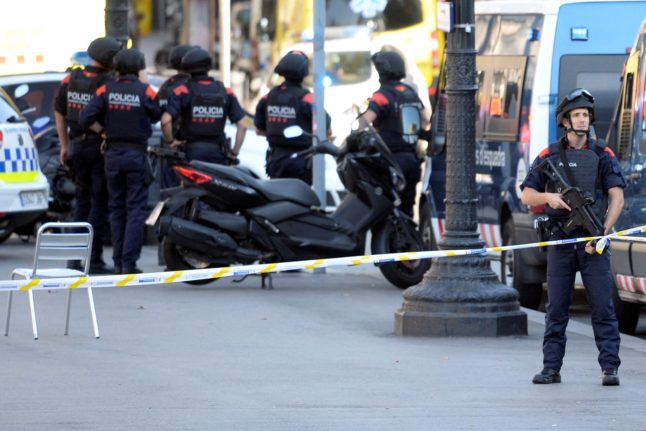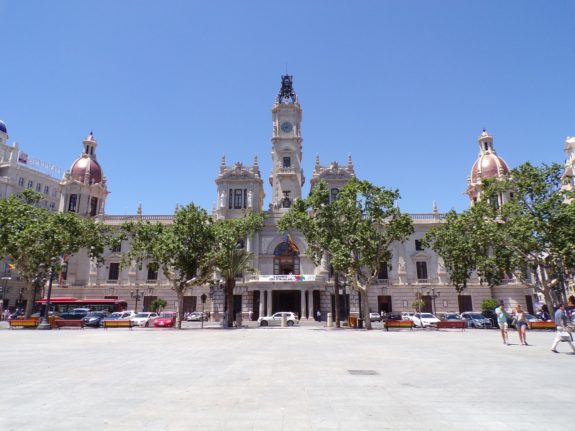Global conflict and instability has raised the terror and security risk in Spain. This is what Spain’s National Security Council (CSN) has concluded following a meeting with government ministers on Tuesday to approve security reports and outline new anti-terror strategies. A 61-page document was compiled to replace the previous one approved in 2019 and will be valid for five years.
Among the topics discussed, which are outlined here on the National Security Council website, were the ongoing conflicts in Gaza and Ukraine and the heightened security threats they pose to Spain.
The war in Gaza, the Council states, presents “a real and direct risk” of an increase in “the terrorist threat, violent extremism and the emergence of new movements that promote a radical and violent ideology.”
READ ALSO: Spain could enforce conscription of ordinary citizens if there is war
Russia’s invasion of Ukraine, the document stresses, is also “a potential catalyst for terrorism”, as it “has led to an increase in the circulation of arms and explosives [in Europe], as well as the participation in the war of volunteer fighters of other nationalities”.
These uncertain global conditions could be exploited by groups or individuals “to undermine public security”, the document adds, and suggests that “state actors could carry out terrorist actions,” in what appears to be an allusion to the assassination of a Russian soldier in Alicante earlier in the year.
READ ALSO: Mystery surrounds death of Russian helicopter deserter in Spain
The meeting and report also outlined broader “risks and threats to national security” grouped into 16 categories, some older and long-established, some much more modern. They range from terrorism and violent radicalisation to the effects of climate change, space vulnerability, cyberspace, organised crime, migratory flows, foreign espionage and interference from abroad.
The CSN detects growing dangers to Spanish airspace, namely “events of commercial satellite launches from aerial platforms crossing controlled airspace, events of re-entry into the Earth’s atmosphere of satellite launcher debris, uncontrolled hot air balloon overflights and an increase in drone overflights over military bases,” things that have all been noted in Spain in recent years.
In terms of terrorism, despite the conflicts in Gaza and Ukraine Islamic terrorism remains the greatest threat to Spanish security. “The repeated dismantling of the leaderships of Daesh and Al Qaeda has not succeeded in eliminating these groups, which act in a more decentralised manner than in previous years,” the report states.
During the period covered by the previous security strategy (2019-2023) “more than 110 [security] operations related to terrorism activities have been carried out,” more than 90 of which were linked to jihadist terrorism, the document details. Just 5 percent were linked to domestic terrorism.
Foreign spies operating in Spain were also highlighted as a threat. The CSN report stated that the decision to expel 27 Russian diplomats from Spain at the beginning of the full-scale invasion of Ukraine in 2022 was useful in this regard. “These expulsions significantly reduced their ability to operate on European territory, which led to a notable decrease in the rate of activity of foreign intelligence services in Spain,” the report states.
READ ALSO: Judge in Spain extends probe into Catalan separatist’s ‘Russia ties’
However, the potential threat from the Kremlin is again mentioned as the driving force behind the barrage of hoaxes and disinformation campaigns. In the case of Spain, Moscow reportedly “focuses on trying to spread a distorted image of migration in the Mediterranean and the situation in Ceuta and Melilla”.
But it’s not just the Russians attempting to misinform the public in Spain. The report also points to “official Chinese media and their propagandists on social networks in Spanish have amplified many pro-Russian narratives”, with messages “based on expressing a rejection of the US and the current international order”.
The report lists 83 Russian disinformation incidents and 12 Chinese in the last year alone. Among these, several were aimed at “creating mistrust” in Spain’s electoral processes.



 Please whitelist us to continue reading.
Please whitelist us to continue reading.
Member comments